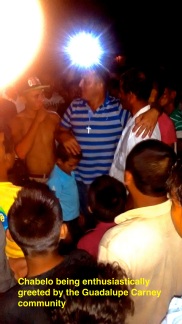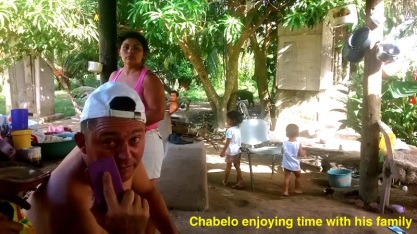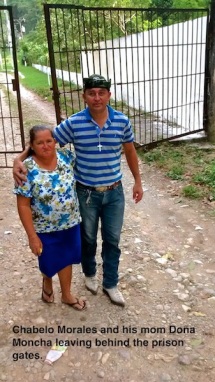Six years, nine months, seven days. This is the amount of time that Jose Isabel Morales, also known as “Chabelo,” had spent unjustly in prison without any concrete evidence that he had committed a crime. Omar Menjivar, Chabelo’s defense attorney, emphasized this period of time through out his opening arguments on July 24th 2015 in the initial hearing of the retrial. It is the second retrial for Chabelo having the two previous convictions annulled by the Supreme Court of Justice of Honduras due to prosecutorial irregularities. The Supreme Court also had intense pressure from national and international human rights groups who demanded Chabelo’s freedom. Chabelo has become a symbol of the criminalization of peasant farmers who struggle for their right to land. He is recognized as a political prisoner through out the world and a victim of the neoliberal land grabbing by the ruling elite of Honduras who have usurped land for monoculture cultivation in order to profit from the US driven trade policies that enrich corporations while further impoverishing those who struggle to feed their families. For background info on the history of Chabelo’s case please visit: https://freechavelo.wordpress.com/summary-of-events/
Atty. Menjivar cited that his client’s constitutional rights had been violated in that the Honduran constitution states that no citizen shall be denied liberty without due process. He also emphasized that the length of incarceration violated the Penal Code of Honduras which states that a person charged with a crime cannot be imprisoned for more than two years without a sentence. He also stated that this was the seventh appeal for the freedom of Mister Morales based on this Penal Code violation.
The Prosecuting Attorney representing Honduras stated in his opening arguments that the Penal Code did not apply in this case because the crime of homicide was waived at some obscure time and that the due process cited in the Constitution was fulfilled by the two previous trials, the ones that were annulled due to his offices judicial irregularities.
The Tribunal recessed for about thirty minutes to deliberate. The anticipation of what decision they would return with left Chabelo’s friends and family nervously chatting about everything but what they thought the decision would be. They had learned to be optimistically cautious while expecting the worst from the previously rigged trials.
The judges returned and what was immediately noticable was that, in contrast to the previous trial, they came back with law books in which to cite precedence for their decisions. The President of the Tribunal began by addressing the Prosecutors arguments. He stated that there is no waiver based on which type of crime a citizen is charged with, all citizens are covered by the Constitution equally. And thus the Prosecutor’s argument had no standing.
The President then turned to address the Defense and stated that due to the violations to the Constitution, Mister Morales’ rights had indeed been violated. In regards to the Penal Code, He referred to a text in which a case heard before the Inter-American Court of Human Rights (IACHR) involved a Honduran citizen vs. Honduras in a similar situation. He stated that the IACHR had found for the citizen thus giving precedence for the freedom of Chabelo while he awaits the retrial. Perhaps they cited the IACHR case for the benefit of the international human rights community. It is indeed telling that they didn’t cite any Honduran justice system precedence adhering to the Penal Code. Perhaps there aren’t any. Well, until now. There were sighs of relief and signs of refrained giddiness. Everyone was joyous, but looking for the other shoe. When would it drop? It didn’t.
The next phase of the hearing was setting the date of the retrial. They scheduled it for September 28th through Oct 9th 2015. The hearing was adjourned.
Hurried calls were immediately made by Chabelo’s family to form a caravan to pick him up, get his belongings from the jail, and him to Guadalupe Carney. That is Chabelo’s community in the Aguán Valley in the Department of Colón in Northern Honduras.
The caravan consisted of Chabelo of course, his mom and two of his brothers, four friends from Guadalupe Carney, four members from the La Lempira land recuperation which is a part of the Unified Campesino Movement of the Aguán (MUCA, in it’s Spanish acronym). Also, prominent members of the Campesino Movement rode along. This included Wilfredo Paz, the Congress member representing the Department of Colon from the LIBRE party; his assistant and personal driver ; Yoni Rivas, Secretary General of the Agrarian Platform, Ex-Secretary General of MUCA, and a past candidate for Congressman; Jaime Cabrera, Director of the Agrarian Platform; Raul Ramirez, current Secretary General of MUCA.
It was a three-hour ride from the jail to Guadalupe Carney with a quick pit stop in Tocoa for a press conference that Wilfredo Paz had arraigned. It then quickly made its way toward Trujillo. Just before Guadalupe Carney, in the small village of Nuevo Mariñones, people were lining either side of the road cheering for Chabelo. There were at least 200 young people on motorcycles waiting to escort the caravan into Guadalupe Carney.
Once there, throngs of people reached into the truck wanting to touch Chabelo, hug him, kiss him, confirm that it was true, that he was really, finally home. The pickups made their way to the community fútbol field were no less than 1000 people emerged to surround Chabelo and cheer his return. The looks on the faces of the community, faces that give an easy smile, but are usually reserved, had this night truly transformed to utter joy. Older men who wore hard earned deep lines in their faces and a slow steadiness in their walk were beaming with the laughter and giddiness equivalent to the younger guys on the motorcycles as they jogged along side the caravan. Many of them leapt with youthful vigor into the back of the pickup. The older women, with tears of joy, all needed to embrace their surrogate son, welcome him home, comfort him and let him know that he is now safe in their embrace. And the youth! Most of them were less than 13 years of age when Chabelo was taken from their community. But they had grown up hearing about the injustice done. They chanted and danced and revved their motorcycles. Their energy and enthusiasm added fuel to the outpouring of affection; affection for a loved one thought lost forever but now back home. Chabelo had forever been in their hearts, but he was now back in their loving presence, and they in his.
 Chabelo gave a heart rendered speech expressing his gratitude for their undying support. There were no fighting back tears, he was with family and could express himself openly, something he has no problem doing anyway, but the usual caution necessary in jail was left back in his old cell. The crowd then made its way to Chabelo’s mom’s house. Doña Moncha, as she is known everywhere, and her daughters and daughters-in-law had prepared food for the caravan.
Chabelo gave a heart rendered speech expressing his gratitude for their undying support. There were no fighting back tears, he was with family and could express himself openly, something he has no problem doing anyway, but the usual caution necessary in jail was left back in his old cell. The crowd then made its way to Chabelo’s mom’s house. Doña Moncha, as she is known everywhere, and her daughters and daughters-in-law had prepared food for the caravan.
People wanted to hear more from Chavelo. He climbed onto the back of a pickup and as if giving a political stump speech he began talking about how important community solidarity was for the campesino movements. He was hopeful that the movements would regroup and return to focusing on building this solidarity from within. There had been too much pressure from outside and conflicts from within that had taken the focus off of the original idea that this wasn’t just about families getting their individual properties, but about everyone working as a movement that grows stronger and more self sustaining. He wasn’t just talking about the movement in Guadalupe Carney, but all the movements in the Aguán working as one big movement. He talked for a good hour and a half and everyone stayed and listened.
It quickly became apparent that it wasn’t just Chabelo who had close to seven years of his life sidetracked, but the campesino movement as well had, during this time, lacked a natural leader.
In the subsequent days since his release, many more people have dropped by Doña Moncha’s house to see for them selves that Chabelo is truly back home and to catch up on old times. He has kept busy with these visits, but also stays busy with his three kids plus two others that live with him and his wife Juana. He also is catching up on seven years of repairs and upkeep to his house and yard. Juana did the best she could by herself raising five kids, and his brothers would help in clearing back overgrowth when the weren’t busy with their own families, but the little things piled up, as they tend to do.
 Chabelo rarely sits and when he does it is to sharpen his machete or to enjoy a break in the hammock with coconut water. The thought lingers in his head that he isn’t out of the woods yet, but he doesn’t dwell on it. He is quickly back at it, putting his life back in order, greeting everyone that passes by with a smile and a hug, and being a loving and present member of his family and community.
Chabelo rarely sits and when he does it is to sharpen his machete or to enjoy a break in the hammock with coconut water. The thought lingers in his head that he isn’t out of the woods yet, but he doesn’t dwell on it. He is quickly back at it, putting his life back in order, greeting everyone that passes by with a smile and a hug, and being a loving and present member of his family and community.
Greg McCain is a Human Rights Defender who has worked, along with the Honduran Solidarity Network http://www.hondurassolidarity.org/, on the international campaign to free Chavelo. He has been staying in the Guadalupe Carney community off and on for three years.


Reblogged this on Human Rights Observation/Honduras.